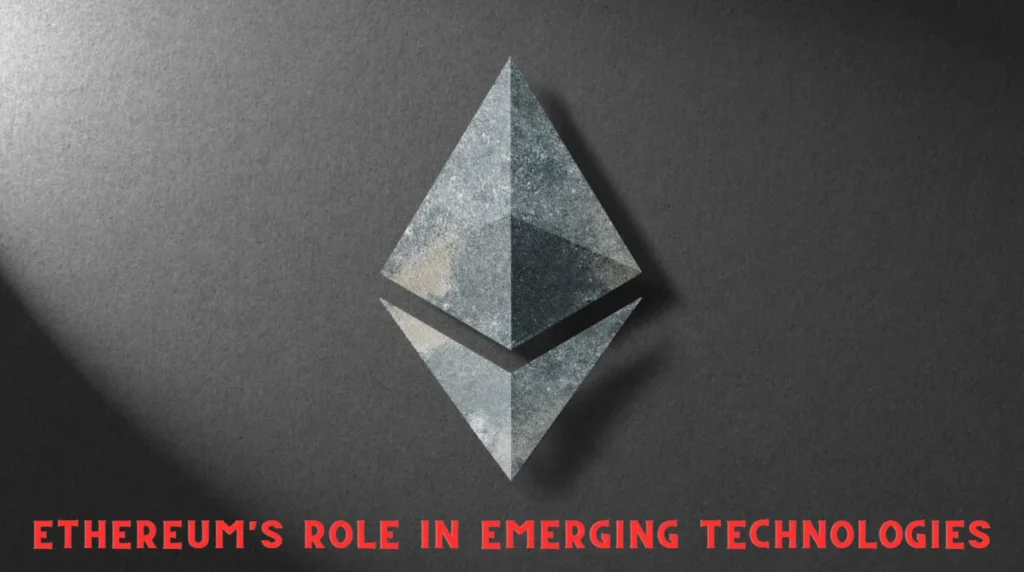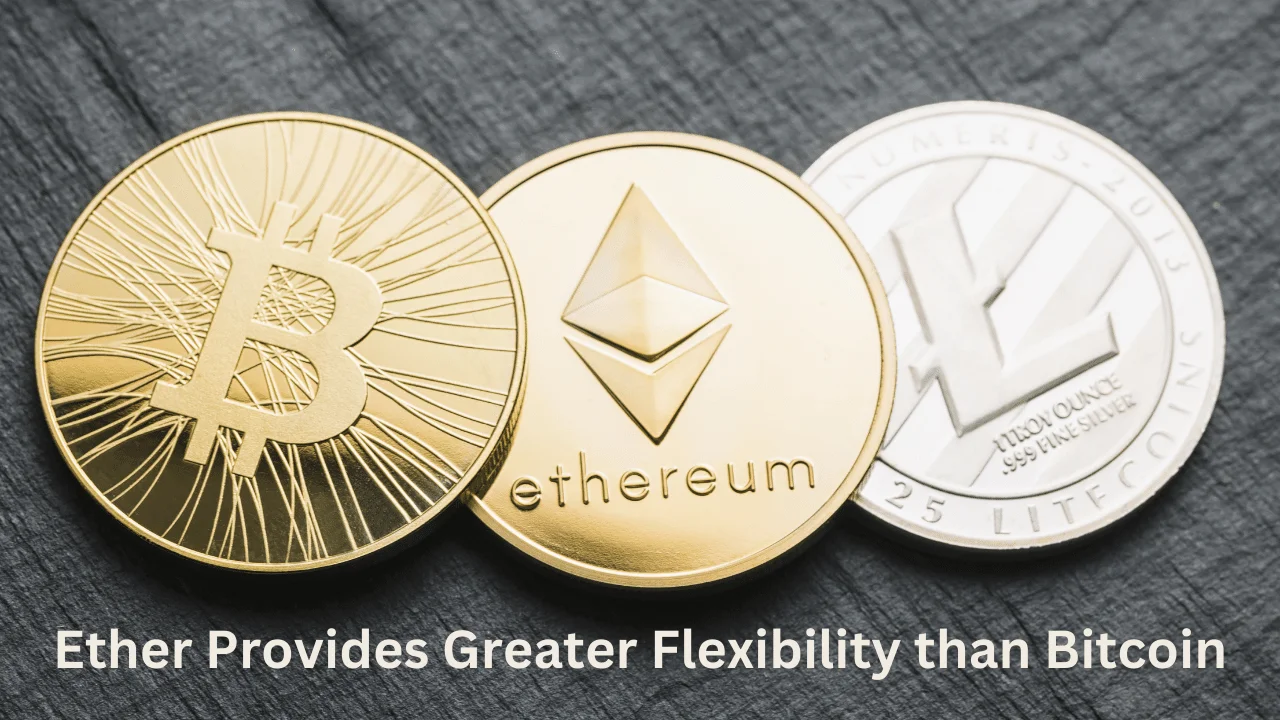Many different cryptocurrencies, each with its own set of advantages and disadvantages, dominate the digital currency market. Ether, the native token of Ethereum, is particularly noteworthy because of its great adaptability in comparison to Bitcoin. This adaptability is due in large part to the fact that Ethereum’s core technology allows for a plethora of features beyond just monetary transactions. Ether Provides Greater Flexibility than Bitcoin, as evidenced by its ability to facilitate smart contracts, decentralized applications (DApps), and other innovative solutions. Examining the technical developments, use cases, and innovations that set Ethereum apart as a frontrunner in the blockchain industry, this article delves into the reasons why Ether offers more flexibility than Bitcoin.
Ethereum and Bitcoin
It is crucial to grasp the nature and principles of these cryptocurrencies before exploring Ethereum’s flexibility in detail. Developers can create and launch smart contracts and decentralized applications (dApps) on the Ethereum blockchain. A safe and automated way to enforce agreements, these contracts are self-executing with the terms written into code. Bitcoin, in contrast, is a digital currency that seeks to serve as both a medium of trade and a medium of value preservation. It is still the most well-known and highly prized cryptocurrency today, and it was the first. In contrast to Ethereum’s vast capabilities, though, its use cases are narrower.
Ethereum’s Technological Advantages

Smart Contract Capabilities
By facilitating automated, programmable transactions, Ethereum’s smart contracts shook up the blockchain industry. When specific criteria are satisfied, these contracts automatically execute, cutting out the middleman. This feature has the potential to revolutionize transaction efficiency and unlock new avenues of complex applications in various industries, including real estate, finance, and more.
Decentralized Applications Development
Ethereum, in contrast to Bitcoin, is a platform where decentralized applications (dApps) can be built and released. These apps run on the blockchain and are decentralized, which makes them more secure and less susceptible to censorship or control by a single party. Decentralized finance (DeFi) systems, gaming platforms, and voting platforms can all benefit from Ethereum’s underlying technology.
Updates and Improvements
One of Ethereum’s most recognizable features is its commitment to constant improvement through updates like Ethereum 2.0’s radical change from proof-of-work (PoW) to proof-of-stake (PoS). By strengthening the network’s scalability, security, and sustainability, these updates hope to make it more user-friendly and accessible to more people.
Integration with Digital Finance
Particularly in the rapidly developing domain of DeFi, Ether’s value in digital finance is unparalleled. To provide financial services decentralised from traditional financial intermediaries, Ethereum allows for the development of decentralised exchanges, lending platforms, and prediction markets. This brings about a new degree of openness and equity while also democratizing the access to banking services.
Digital Identity Management
One area where Ethereum’s blockchain shines is in digital identity management. Using Ethereum’s decentralization and security features, users can take charge of their digital identities independently of third parties. Since our world is becoming more and more digital, this demonstrates how versatile Ethereum is and how important it is for privacy and security.
Ethereum’s Role in Emerging Technologies

Gaming and Virtual Economies
Ethereum’s blockchain technology enables the creation of digital assets in games that players can actually own, expanding its influence into the gaming industry. The ability to buy, sell, and trade items and characters in safe, transparent environments has created new gaming experiences and business models.
Decentralized Finance
The popularity of Ethereum’s decentralized finance has skyrocketed because it eliminates the need for a central bank or other intermediary in a variety of financial transactions, including lending and borrowing money and trading complex derivatives. Users gain greater agency over their financial transactions, and conventional financial systems face new competition.
Non-Fungible Tokens (NFTs)
Artists, musicians, and content creators can now monetize their work in ways that were previously impossible, all thanks to Ethereum’s blockchain, which is the foundation for the NFT revolution. Ethereum’s NFTs open up new monetary possibilities in the digital realm by facilitating the purchase, sale, and exchange of one-of-a-kind digital objects.
Potential for Future Developments
There is a limitless amount of room for growth and improvement in the Ethereum ecosystem. Ethereum is poised to continue leading the charge of the digital revolution, fostering innovation and adoption in a wide range of industries, thanks to its continuous improvements and the growing popularity of blockchain technology.
Ethereum’s Broad Use Cases
The robust capabilities of Ethereum reach far beyond the usual financial applications, impacting a wide range of industries. This section explores different areas where Ethereum’s technology has a revolutionary impact, highlighting how versatile and multipurpose it is.
Ethereum in Supply Chain Management
When it comes to managing supply chains, Ethereum can greatly improve both transparency and efficiency. Businesses can transparently trace the origin to consumer of goods by integrating Ethereum’s blockchain technology. This aids in reducing fraud, increasing supply chain accountability, and guaranteeing product authenticity.
Health Care Systems
Ethereum has the potential to revolutionize data sharing and privacy in the healthcare industry. Patient records can be safely stored using Ethereum-based blockchain solutions, which provide authorized parties easy access without compromising patient confidentiality. Important in the healthcare industry, this guarantees a better degree of data security and integrity.
Ethereum’s Impact on Real Estate Transactions
Everything from property sales to leasing can be made easier with Ethereum in the real estate industry. Automating escrow services, payments, and title transfers are just a few ways smart contracts can streamline real estate transactions, cutting out middlemen and their fees.
Innovation with Ethereum
Ethereum is more than a digital currency; it’s a foundation for new ideas. It is an essential tool for propelling new technological advancements due to its versatility and ability to support various applications.
Secure Voting Systems
Security, transparency, and verifiability in voting are three ways in which Ethereum can revolutionize electoral systems. This would make the audit trail more transparent and less susceptible to fraud, which would boost confidence in the democratic process.
Autonomous Organizations
Entities without a central leadership are known as decentralized autonomous organizations (DAOs), and they are run by programming coded into smart contracts. Decentralized autonomous organizations (DAOs) are a new kind of organization that can be set up and run on the Ethereum platform.
Renewable Energy Markets
With the help of Ethereum’s blockchain, users can build decentralized energy trading platforms that facilitate the efficient and transparent purchase, sale, and exchange of renewable energy. Clean energy resources may become more accessible and affordable as a result of this.
Must Read: 5 Ways to Keep Your Bitcoin-Native Assets Safe
FAQs
What makes Ethereum more flexible than Bitcoin?
Ethereum’s smart contracts and decentralized applications provide a broader range of use cases beyond just monetary transactions.
How do Ethereum’s smart contracts work?
Smart contracts are self-executing contracts with the terms of the agreement directly written into code, automatically enforced when conditions are met.
Can Ethereum be used for more than financial transactions?
Yes, Ethereum supports a variety of applications including gaming, healthcare, real estate, and more, thanks to its versatile blockchain technology.
What are decentralized applications on Ethereum?
Decentralized applications (dApps) are applications that run on a blockchain network, offering increased security and resistance to censorship.
How does Ethereum contribute to digital identity management?
Ethereum allows users to manage their digital identities securely and privately, reducing dependency on centralized authorities.
Conclusion
With its wide range of features, such as smart contracts, decentralized application development, and notable advancements in digital finance and identity management, Ether Provides Greater Flexibility than Bitcoin. With its ever-expanding technological framework, Ethereum is poised to become an increasingly indispensable tool in the digital age, opening up thrilling opportunities for developers and users alike. Looking at how Ethereum stacks up against Bitcoin reveals that it is the platform that is leading the charge for blockchain applications in the future, in addition to supporting a digital currency.

Brandy Stewart, an enchanting wordsmith and seasoned blogger, weaves compelling narratives that transport readers to uncharted territories. Infused with perceptive viewpoints and dynamic storytelling, Doris exhibits a command of language that enthralls both hearts and minds, leaving a lasting mark on the literary panorama.

